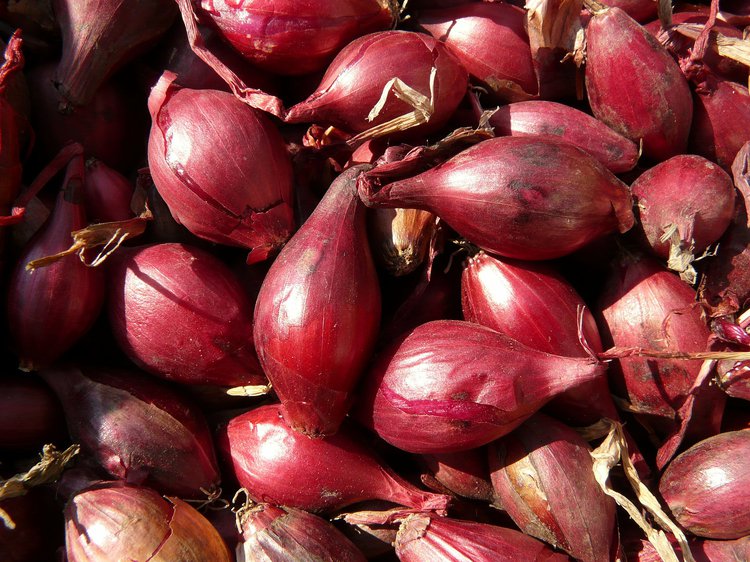Shallots, scientifically known as Allium cepa var. aggregatum, are a type of onion closely related to the onion and garlic family. Here’s some information about shallots:
Shallots Meaning in Urdu: Shallots are known as “Zebay” in Urdu.
What Are Shallots Used For: Shallots are used in cooking to add flavor to various dishes. They have a mild, sweet, and delicate taste that works well in sauces, dressings, marinades, stir-fries, and other culinary preparations.
What Does a Shallot Look Like : Shallots have a distinctive appearance. They are smaller than regular onions, with a brown papery skin and a bulbous shape. Inside, they have multiple cloves or segments, similar to garlic, that are enclosed in a thin, pale reddish or pinkish skin.
Shallot Recipes: Shallots are a popular ingredient in many recipes. They can be used in soups, stews, roasted vegetables, vinaigrettes, sautés, and various meat, seafood, and vegetarian dishes. Shallots can also be pickled or used as a garnish.
Shallot vs. Onion: Shallots and onions belong to the same family but have some differences in flavor and appearance. Shallots have a milder and sweeter taste compared to onions. They also have a more complex flavor profile. In terms of appearance, shallots are smaller and have multiple cloves, while onions are larger and have a single bulb.
Shallots vs. Onions Health Benefits: Shallots and onions share many health benefits as they both contain vitamins, minerals, antioxidants, and dietary fiber. They have similar potential benefits for heart health, immune support, and anti-inflammatory effects. However, specific research comparing the health benefits of shallots and onions is limited.
Shallots Benefits for Skin: Shallots, like other allium vegetables, contain antioxidants that may help promote healthy skin by reducing oxidative stress. However, there is limited scientific research specifically focused on shallots’ benefits for the skin.
Shallots Benefits for Hair: Shallots are sometimes used topically in hair care remedies to promote hair growth and improve scalp health. The sulfur compounds present in shallots are believed to nourish the hair follicles. However, more scientific research is needed to establish specific benefits of shallots for hair.
Side Effects of Shallots: Shallots are generally safe to consume. However, some people may experience digestive discomfort, such as bloating or gas, after eating shallots. In rare cases, allergic reactions can occur in individuals with onion or garlic allergies.
Shallots Benefits in Pregnancy: Shallots are a source of essential nutrients, including vitamins and minerals. However, it’s always advisable to consult with a healthcare professional regarding specific dietary considerations during pregnancy.
Shallot or Onion: Both shallots and onions can potentially benefit hair growth due to their sulfur content. However, individual preferences and tolerances may vary, so it’s best to choose the option that works well for you.
Shallots vs. Onions Nutrition: Shallots and onions have similar nutritional profiles. They are low in calories and fat and provide vitamins, minerals, antioxidants, and dietary fiber. The specific nutrient content may vary slightly between the two.
Are Shallots Good for Your Liver: Shallots, like other allium vegetables, contain sulfur compounds that may have potential benefits for liver health. However, more scientific research is needed to establish a direct relationship between shallots and liver health.
Onion vs. Shallot vs. Scallion: Onions, shallots, and scallions (green onions) are all members of the Allium family but have distinct characteristics. Onions have a pungent flavor and come in various colors and sizes. Shallots have a milder taste and multiple cloves. Scallions have a mild onion flavor and are characterized by long, slender green stalks.
Shallots Vitamins: Shallots contain various vitamins, including vitamin C, vitamin B6, and folate. The specific vitamin content may vary depending on the size and variety of the shallot.
Shallots Medicinal Uses: Shallots, like other allium vegetables, have been used in traditional medicine for their potential health benefits. However, it’s important to note that traditional uses may not always have scientific evidence to support them.
Shallots Advantages and Disadvantages: Shallots offer a mild and complex flavor to dishes, making them a versatile culinary ingredient. However, they can be more expensive and less readily available compared to regular onions. Additionally, some individuals may experience digestive discomfort or allergic reactions to shallots.
Please note that while I strive to provide accurate and up-to-date information, it is always recommended to consult with a healthcare professional or nutritionist for personalized advice and guidance regarding specific health concerns and dietary needs.

